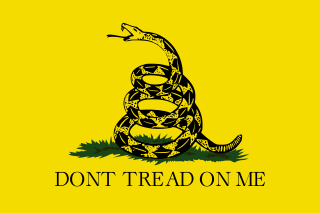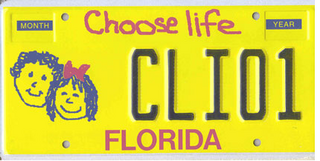Symbolic speech is a legal term in United States law used to describe actions that purposefully and discernibly convey a particular message or statement to those viewing it. Symbolic speech is recognized as being protected under the First Amendment as a form of speech, but this is not expressly written as such in the document. One possible explanation as to why the Framers did not address this issue in the Bill of Rights is because the primary forms for both political debate and protest in their time were verbal expression and published word, and they may have been unaware of the possibility of future people using non-verbal expression. Symbolic speech is distinguished from pure speech, which is the communication of ideas through spoken or written words or through conduct limited in form to that necessary to convey the idea.

The Gadsden flag is a historical American flag with a yellow field depicting a timber rattlesnake coiled and ready to strike. Beneath the rattlesnake are the words "DONT TREAD ON ME". Some modern versions of the flag include an apostrophe.

The Sons of Confederate Veterans (SCV) is an American neo-Confederate nonprofit organization of male descendants of Confederate soldiers that commemorates these ancestors, funds and dedicates monuments to them, and promotes the pseudohistorical Lost Cause ideology and corresponding white supremacy.
In the United States, vehicle registration plates, known as license plates, are issued by a department of motor vehicles, an agency of the state or territorial government, or in the case of the District of Columbia, the district government. Some Native American tribes also issue plates. The U.S. federal government issues plates only for its own vehicle fleet and for vehicles owned by foreign diplomats. Until the 1980s, diplomatic plates were issued by the state in which the consulate or embassy was located.

Choose Life license plates are specialty license plates available in 33 states in the United States that express an anti-abortion message. The plates are the concept of Choose Life, Inc., an anti-abortion advocacy group based in Ocala, Florida. It was founded in 1997 by Randy Harris, a Marion County commissioner, after being inspired by an environmental license plate on the car in front of him to use specialty license plates as a way to raise funds for crisis pregnancy centers, which are nonprofit organizations established to counsel women against receiving abortions. The plates feature the phrase "Choose Life", a slogan used by the anti-abortion movement, and a Microsoft Paint style drawing of two children.

The Roberts Court is the time since 2005 during which the Supreme Court of the United States has been led by John Roberts as Chief Justice. Roberts succeeded William Rehnquist as Chief Justice after the latter's death.

John Marshall Rogers is a Senior United States circuit judge of the United States Court of Appeals for the Sixth Circuit.

Jerry Edwin Smith is an American attorney and jurist serving as a United States circuit judge of the United States Court of Appeals for the Fifth Circuit.
Wooley v. Maynard, 430 U.S. 705 (1977), was a case in which the Supreme Court of the United States held that New Hampshire could not constitutionally require citizens to display the state motto upon their license plates when the state motto was offensive to their moral convictions.
Snyder v. Phelps, 562 U.S. 443 (2011), is a landmark decision by the Supreme Court of the United States in which the Court held that speech made in a public place on a matter of public concern cannot be the basis of liability for a tort of emotional distress, even if the speech is viewed as offensive or outrageous.

Summers v. Adams, 669 F. Supp. 2d 637, was a case where the United States District Court for the District of South Carolina ruled that South Carolina's "I Believe" Act was unconstitutional for violating the Establishment Clause of the First Amendment to the United States Constitution. The law authorized the state's Department of Motor Vehicles to create a license plate that had to contain "the words 'I Believe' and a cross superimposed on a stained glass window."
Knox v. Service Employees International Union, 567 U.S. 298 (2012), is a United States constitutional law case. The United States Supreme Court held in a 7–2 decision that Dianne Knox and other non-members of the Service Employees International Union did not receive the required notice of a $12 million assessment the union charged them to raise money for the union's political fund. In a tighter 5–4 ruling, the court further held that the long-standing precedent, the First Amendment requirement that non-union members covered by union contracts be given the chance to "opt out" of special fees was insufficient. Setting new precedent, the majority ruled that non-members shall be sent notice giving them the option to opt into special fees.

Although the Confederate States of America dissolved at the end of the American Civil War (1861–1865), its battle flag continues to be displayed as a symbol. The modern display began during the 1948 United States presidential election when it was used by the Dixiecrats, a political party that opposed civil rights for African Americans. Further display of the flag was a response to the civil rights movement and the passage of federal civil rights laws in the 1950s and 1960s.
Reed v. Town of Gilbert, 576 U.S. 155 (2015), is a case in which the United States Supreme Court clarified when municipalities may impose content-based restrictions on signage. The case also clarified the level of constitutional scrutiny that should be applied to content-based restrictions on speech. In 2005, Gilbert, Arizona adopted a municipal sign ordinance that regulated the manner in which signs could be displayed in public areas. The ordinance imposed stricter limitations on signs advertising religious services than signs that displayed "political" or "ideological" messages. When the town's Sign Code compliance manager cited a local church for violating the ordinance, the church filed a lawsuit in which they argued the town's sign regulations violated its First Amendment right to the freedom of speech.
Packingham v. North Carolina, 582 U.S. ___ (2017), is a case in which the Supreme Court of the United States held that a North Carolina statute that prohibited registered sex offenders from using social media websites is unconstitutional because it violates the First Amendment to the U.S. Constitution, which protects the freedom of speech.
Compelled speech is a transmission of expression required by law. A related legal concept is protected speech. Just as freedom of speech protects free expression, in many cases it similarly protects an individual from being required to utter or otherwise express a thought with which that individual disagrees.
National Institute of Family and Life Advocates v. Becerra, 585 U.S. ___ (2018), was a case before the Supreme Court of the United States addressing the constitutionality of California's FACT Act, which mandated that crisis pregnancy centers provide certain disclosures about state services. The law required that licensed centers post visible notices that other options for pregnancy, including abortion, are available from state-sponsored clinics. It also mandated that unlicensed centers post notice of their unlicensed status. The centers, typically run by Christian non-profit groups, challenged the act on the basis that it violated their free speech. After prior reviews in lower courts, the case was brought to the Supreme Court, asking "Whether the disclosures required by the California Reproductive FACT Act violate the protections set forth in the free speech clause of the First Amendment, applicable to the states through the Fourteenth Amendment."
Barr v. American Assn. of Political Consultants, Inc., 591 U.S. ___ (2020), was a United States Supreme Court case involving the use of robocalls made to cell phones, a practice that had been banned by the Telephone Consumer Protection Act of 1991 (TCPA), but which exemptions had been made by a 2015 amendment for government debt collection. The case was brought by the American Association of Political Consultants, an industry trade group, and others that desired to use robocalls to make political ads, challenging the exemption unconstitutionally favored debt collection speech over political speech. The Supreme Court, in a complex plurality decision, ruled on July 6, 2020, that the 2015 amendment to the TCPA did unconstitutionally favor debt collection speech over political speech and violated the First Amendment.
Shurtleff v. City of Boston, 596 U.S. ___ (2022), was a United States Supreme Court case related to the First Amendment to the United States Constitution. The case concerned the City of Boston's program that allowed groups to have their flags flown outside Boston City Hall. In a unanimous 9–0 decision, the Court ruled that the city violated a Christian group's free speech rights when it denied their request to raise a Christian flag over City Hall.
Spence v. Washington, 418 U.S. 405 (1974), was a United States Supreme Court case dealing with non-verbal free speech and its protections under the First Amendment. The Court, in a per curiam decision, ruled that a Washington state law that banned the display of the American flag adorned with additional decorations was unconstitutional as it violated protected speech. The case established the Spence test that has been used by the judicial system to determine when non-verbal speech may be sufficiently expressive for First Amendment protections.








